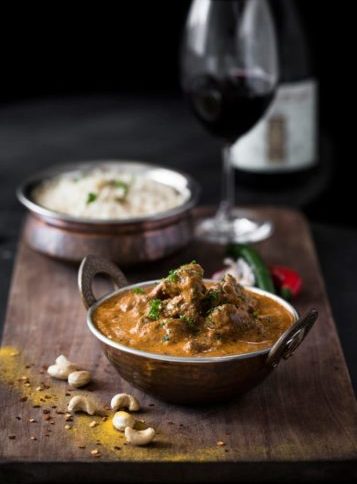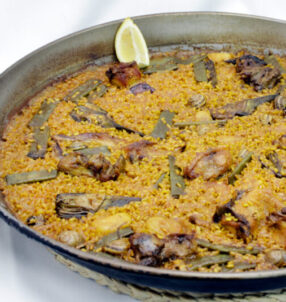Although we are primarily concerned with Valencian wine and food at VÍ Vid, we have written several times before about some other drinks available, including new gins from Nodus and Vegamar and we regularly update on new releases of the ever popular ‘vermuts’ produced in the community. We also have an interest in matching wine with good food and it is one of our specialist subjects when we have done courses for restaurant staff and sumilleres. Valencia is seeing a rapid growth in Indian and Pakistani restaurants with new venues every year.
Traditionally (in Britain anyway) the accompaniment for curry has been beer, whether local beers, lagers or Indian beers such as Kingfisher and Cobra made under licence. Of course in India, particularly in the Bengal, the drink of choice would be a lassi (a yoghurt or curd-based drink with fruit, spice or salt added). There are several Valencian Indian restaurants now serving lassi as an alternative to beer or wine. The yoghurt acts to reduce the heat of the spices and for those with a delicate palate this might just make the difference between a meal being bearable or not!
But there is no question the right wine with a curry can enhance the meal, just as it can with any other style of food. The purpose of this article therefore is to add a little light to the question: “Which wine goes best with curry?”
The answer is that there are actually a range of wines which suit individual curries and individual wines which go pretty well with all curries.
Indian dishes, particularly curries, feature an array of different sauces, hot, (with chilli) rich (Madras), tomato-based (Rogan Josh), green with herbs (Haryali), and light and creamy (Kormas, Pasandas).
Tomato-based sauces do well with white wines that balance their acidity. A fruity rosé (still or sparkling) provides another excellent option. A dish made with a cream-based sauce is an excellent partner for deeper reds with medium tannins. Here in Valencia, Verdejo is a widely available single grape variety from Rueda which goes well with most of these dishes. Finca Collado Blanco from DO Alicante goes with everything! For a Rosado try a Monastrell from DO Alicante or a Cabernet Sauvignon from DO Valencia.
There is a common misconception that all Indian food is hot. While many dishes do have a decent level of heat, not all of them are going to scorch your tongue. To counterbalance chilli , consider a wine that’s lower in alcohol, has a bit of sweetness, and is served cool. Mild dishes work well with dry wines, and medium ones pair well with wines that are off-dry. Wines from Macabeo are in our experience a ‘no-no,’ the fruit and acidity is much better matched with Chinese food.
Often, a well-cooked curry is a fragrant dish and the sum of the other spices such as coriander, cumin and tamarind. With these we recommend spicy wines. Try a Gewürztraminer, Viognier or an Austrian Grüner veltliner. The first two varieties are grown here in Valencia and Castellón whilst the third is a little more difficult to find!
We matched an (admittedly rare and good) Prosecco with papadums and vegetable samosas at one of our experimental meals last week, following it with a French Viognier from the Cevennes but wines from Cent Piques in Valencia or Clos d’Esgarracordes (Baron d’Alba) in Castellón would both go well. The Prosecco was married with a whole sea bass cooked in a tandoor and marinaded for four hours with a Tikka sauce and the Viognier matched well too.
As with any other cuisine, the meat in your dish typically affects your wine choice. Meat curries match well with a red such as a full-bodied Pinot Noir or more delicate Shiraz. Chicken, seafood, and vegetable curries, on the other hand, go quite nicely with the acidity and fruitiness of a Pinot Grigio or Gewürztraminer. Again, make sure to keep the sauce and spice level in mind.
With red wines, slightly lower alcohol levels seem to be the answer where the young fruit predominates. You could try a Californian Zinfandel (available on-line ) to try at home with a beef dish (such as a Kerala Nadan) as we did. This went well with the Spinach curry which was served with it. But some local varieties such as Giró, Mando, or Embolicaire from DO Valencia would fit this lighter, fruitier, role.
We must not forget sparkling wines such as Champagne or Cava. The bubbles in such wines act as a conductor, much as they do with the alcohol, conveying the flavour to the palate providing the carbon dioxide is not aggressive. Tikka Masala and Korma which are lighter creamier dishes go particularly well with a lighter Cava, ‘Roxanne’ from Chozas Carrascal e.g. but fuller Cavas such as Reservas with a longer bottle ageing, or good Champagne go well with spicier dishes, especially in our experience where the ginger content in the food is higher. (Anything with more than 18 months minimum on the lees.)
Finally, we have found that wine is generally overpriced on restaurant lists and that there are a good few restaurant owners who accept that they could know more about the wine they sell. There are two remedies for this. Don’t be afraid to complain about the mark-up, you can google the price of a wine to see what it sells for before you order it….and remember they will have paid a lower price at ‘trade’. Secondly, you can ask your favourite restaurant to get in a wine which you know goes well with your favourite food. We know of one which already does this for customers and two others who have asked which wines they should put on their lists.
We have found Indian restaurants in Valencia to be flexible in the amount of spicing, eager to please and attentive to the requirements of diners. Asking for your favourite wine to be stocked is part of the service.
Of course, where there is no wine list… take your own!
Marian Darás and Riki Wigley
Article copyright 24/7 Valencia / VÍ Vid
VÍ Vid is a project supporting the development of wine knowledge and gastronomy in the Valencian Community. We run wine clubs, give tastings of Valencian wines in English and support wine-makers and bodegas directly. We are also contributers to Verema´s ADN Wine Guide. We can be found in Instagram (Vivid8402), and through our blog VÍ Vid at https://vvidblog.wordpress.com and https://www.facebook.com/Vivideventos and in Twitter @vividvinos.
Related Post
This site uses Akismet to reduce spam. Learn how your comment data is processed.


























Leave a comment